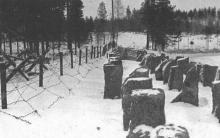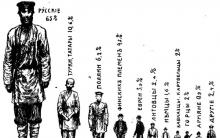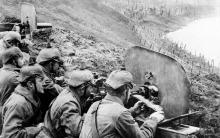The Entente is a military-political bloc consisting of England, France and Russia, otherwise it was called the “Triple Entente”. It mainly took shape in the period from 1904 to 1907, and the demarcation of the great powers was completed before the First World War. The emergence of this term dates back to 1904 and was originally intended to denote an alliance between the British and the French, in which the expression “cordial agreement” was used, dedicated to the memory of the Anglo-French alliance, which was created for a short time in the 1840s, and had the same Name. The Entente was created as a reaction to the established Triple Alliance and the strengthening of Germany as a whole, as well as an attempt to prevent its hegemony on the continent, initially from the Russian side (France initially took an anti-German position), and from the British state. In the face of the threat posed by German hegemony, it was forced to abandon the traditional policy of “brilliant isolation” and switch to the traditional policy of joining a bloc against the strongest power on the continent. The most important incentive for this choice of England was the existence of the German naval program, as well as the colonial claims of Germany.
And in this state, on his part, such a turn of events was perceived as “encirclement,” which served as an incentive for military preparations that were perceived as purely defensive. After Germany was defeated, the Supreme Council of the Entente practically performed the functions of a “world government” and was involved in arranging the post-war order. Although, due to the failure of the Entente’s policy in Turkey and Russia, the limits of its power were revealed, undermined by the internal contradictions that existed between the victorious powers. The Entente as a political "world government" ceased to exist after the League of Nations was formed, and militarily this was influenced by the emergence of a new, post-war system of alliances.
The Entente was initially interested in the Bolshevik revolution in Russia primarily, in particular, in the catastrophic military prospects for it (Russia's exit from the war, its subsequent transformation into a German raw materials appendage); Subsequently, the overthrow of the Bolshevik government became the principle of “defense of civilization.” The main powers participating in the intervention were, of course, pursuing pragmatic political and economic interests. 1917 December 23 - England and France sign an agreement regarding issues of joint intervention in the Russian state.
The Triple Alliance, which included Germany, Austria-Hungary and Italy, took shape from 1879 to 1882. The formation of the Triple Alliance was aimed at achieving hegemony in the world. The Entente bloc was created as a counterweight to the Triple Alliance. The name "Entente" is translated from French as "consent". It included Russia, France, and Great Britain.
Attempts to weaken the Entente were made by the Triple Alliance more than once. A convenient reason was the contradictions between Russia and England in Iran. However, Russia's military campaigns in the Balkans, carried out in the period from 1912 to 1913, made it possible to significantly strengthen relations between the countries of this military-political bloc. But it should be noted that relations between the Entente member countries periodically worsened. The Triple Alliance and the Entente were powerful opposing forces.
The Entente alliance finally took shape not long before World War I. After the revolutionary events of 1917, it represented a union of many more countries. The Entente included: Japan, Belgium, Greece, Serbia, Romania and so on. The main roles were played by France, the USA and England.
The leadership of the Entente was carried out during conferences between the allied countries in the period from 1915 to 1918. But this was not enough to create a unified leadership of the union. The reasons for the lack of unified leadership were: the dissimilarity of interests of the countries participating in the union, different distances from theaters of military operations, and different military capabilities.
February Revolution of 1917 in Russia
Since the revolution of 1905-1907 did not resolve the economic, political and class contradictions in the country, it was a prerequisite for the February Revolution of 1917. The participation of Tsarist Russia in the First World War showed the inability of its economy to carry out military tasks. Many factories stopped operating, the army experienced a shortage of equipment, weapons, and food. The country's transport system is absolutely not adapted to martial law, agriculture has lost ground. Economic difficulties increased Russia's external debt to enormous proportions.
Intending to extract maximum benefits from the war, the Russian bourgeoisie began to create unions and committees on issues of raw materials, fuel, food, etc.
True to the principle of proletarian internationalism, the Bolshevik party revealed the imperialist nature of the war, which was waged in the interests of the exploiting classes, its aggressive, predatory essence. The party sought to channel the discontent of the masses into the mainstream of the revolutionary struggle for the collapse of the autocracy.
In August 1915, the “Progressive Bloc” was formed, which planned to force Nicholas II to abdicate in favor of his brother Mikhail. Thus, the opposition bourgeoisie hoped to prevent revolution and at the same time preserve the monarchy. But such a scheme did not ensure bourgeois-democratic transformations in the country.
The reasons for the February Revolution of 1917 were anti-war sentiment, the plight of workers and peasants, political lack of rights, the decline in the authority of the autocratic government and its inability to carry out reforms.
The driving force in the struggle was the working class, led by the revolutionary Bolshevik Party. The allies of the workers were the peasants, demanding the redistribution of land. The Bolsheviks explained to the soldiers the goals and objectives of the struggle.
The main events of the February revolution happened quickly. Over the course of several days, a wave of strikes took place in Petrograd, Moscow and other cities with the slogans “Down with the tsarist government!”, “Down with the war!” On February 25 the political strike became general. Executions and arrests were unable to stop the revolutionary onslaught of the masses. Government troops were put on alert, the city of Petrograd was turned into a military camp.
February 26, 1917 marked the beginning of the February Revolution. On February 27, soldiers of the Pavlovsky, Preobrazhensky and Volynsky regiments went over to the side of the workers. This decided the outcome of the struggle: on February 28, the government was overthrown.
The outstanding significance of the February Revolution is that it was the first popular revolution in history of the era of imperialism, which ended in victory.
During the February Revolution of 1917, Tsar Nicholas II abdicated the throne.
Dual power arose in Russia, which became a kind of result of the February Revolution of 1917. On the one hand, the Council of Workers' and Soldiers' Deputies is a body of people's power, on the other hand, the Provisional Government is an organ of the dictatorship of the bourgeoisie headed by Prince G.E. Lvov. In organizational matters, the bourgeoisie was more prepared for power, but was unable to establish autocracy.
The provisional government pursued an anti-people, imperialist policy: the land issue was not resolved, factories remained in the hands of the bourgeoisie, agriculture and industry were in dire need, and there was not enough fuel for railway transport. The dictatorship of the bourgeoisie only deepened economic and political problems.
After the February revolution, Russia experienced an acute political crisis. Therefore, there was a growing need for the bourgeois-democratic revolution to develop into a socialist one, which was supposed to lead to the power of the proletariat.
One of the consequences of the February revolution is the October revolution under the slogan “All power to the Soviets!”
The Entente (from the French Entente, Entente cordiale - cordial agreement) - an alliance of Great Britain, France and Russia (Triple Entente), took shape in 1904-1907 and united more than 20 states during the First World War (1914-1918) against the coalition of the Central Powers , including the USA, Japan, Italy.
The creation of the Entente was preceded by the conclusion of a Russian-French alliance in 1891-1893 in response to the creation of the Triple Alliance (1882) led by Germany.
The formation of the Entente is associated with the disengagement of the great powers at the end of the 19th - beginning of the 20th century, caused by a new balance of power in the international arena and the aggravation of contradictions between Germany, Austria-Hungary, Italy on the one hand, France, Great Britain and Russia, on the other.
The sharp intensification of Anglo-German rivalry, caused by Germany's colonial and trade expansion in Africa, the Middle East and other areas, and the naval arms race, prompted Great Britain to seek an alliance with France and then with Russia.
In 1904, a British-French agreement was signed, followed by a Russo-British agreement (1907). These treaties actually formalized the creation of the Entente.
Russia and France were allies bound by mutual military obligations determined by the military convention of 1892 and subsequent decisions of the general staffs of both states. The British government, despite contacts between the British and French general staffs and naval commands established in 1906 and 1912, did not make specific military commitments. The formation of the Entente softened the differences between its participants, but did not eliminate them. These differences were revealed more than once, which Germany took advantage of in an attempt to tear Russia away from the Entente. However, strategic calculations and aggressive plans of Germany doomed these attempts to failure.
In turn, the Entente countries, preparing for war with Germany, took steps to separate Italy and Austria-Hungary from the Triple Alliance. Although Italy formally remained part of the Triple Alliance before the outbreak of World War I, the ties of the Entente countries with it grew stronger, and in May 1915 Italy went over to the Entente side.
After the outbreak of the First World War, in September 1914 in London, an agreement was signed between Great Britain, France and Russia on the non-conclusion of a separate peace, replacing the allied military treaty. In October 1915, Japan joined this agreement, which in August 1914 declared war on Germany.
During the war, new states gradually joined the Entente. By the end of the war, the states of the anti-German coalition (not counting Russia, which withdrew from the war after the October Revolution of 1917) included Great Britain, France, Belgium, Bolivia, Brazil, Haiti, Guatemala, Honduras, Greece, Italy, China, Cuba, Liberia, Nicaragua , Panama, Peru, Portugal, Romania, San Domingo, San Marino, Serbia, Siam, USA, Uruguay, Montenegro, Hijaz, Ecuador, Japan.
The main participants of the Entente - Great Britain, France and Russia, from the first days of the war entered into secret negotiations on the goals of the war. The British-French-Russian agreement (1915) provided for the transfer of the Black Sea straits to Russia, the London Treaty (1915) between the Entente and Italy determined the territorial acquisitions of Italy at the expense of Austria-Hungary, Turkey and Albania. The Sykes-Picot Treaty (1916) divided Turkey's Asian possessions between Great Britain, France and Russia.
During the first three years of the war, Russia drew off significant enemy forces, quickly coming to the aid of the Allies as soon as Germany launched serious offensives in the West.
After the October Revolution of 1917, Russia’s withdrawal from the war did not disrupt the Entente’s victory over the German bloc, because Russia fully fulfilled its allied obligations, unlike England and France, who more than once broke their promises of help. Russia gave England and France the opportunity to mobilize all their resources. The struggle of the Russian army allowed the United States to expand its production power, create an army and replace Russia, which had emerged from the war - the United States officially declared war on Germany in April 1917.
After the October Revolution of 1917, the Entente organized an armed intervention against Soviet Russia - on December 23, 1917, Great Britain and France signed a corresponding agreement. In March 1918, the Entente intervention began, but the campaigns against Soviet Russia ended in failure. The goals that the Entente set for itself were achieved after the defeat of Germany in the First World War, but the strategic alliance between the leading Entente countries, Great Britain and France, remained in the following decades.
The general political and military leadership of the bloc's activities in various periods was carried out by: Inter-Allied Conferences (1915, 1916, 1917, 1918), the Supreme Council of the Entente, the Inter-Allied (Executive) Military Committee, the Supreme Commander-in-Chief of the Allied Forces, the main headquarters of the Supreme Commander-in-Chief, commanders-in-chief and headquarters at individual theaters of military operations. Such forms of cooperation were used as bilateral and multilateral meetings and consultations, contacts between commanders-in-chief and general staffs through representatives of the allied armies and military missions. However, the difference in military-political interests and goals, military doctrines, an incorrect assessment of the forces and means of the opposing coalitions, their military capabilities, the remoteness of the theaters of military operations, and the approach to the war as a short-term campaign did not allow the creation of a unified and permanent military-political leadership of the coalition in the war.
The material was prepared based on information from RIA Novosti and open sources
By 1914, Europe was split into two major alliances, which included the six most powerful powers. Their confrontation escalated into a world war. Britain, France and Russia formed the Entente, and Germany, Austria-Hungary and Italy united in the Triple Alliance. The split into alliances aggravated the explosiveness and completely quarreled the countries.
The beginning of the formation of alliances
Having won a series of victories (1862-1871), Prussian Chancellor Otto von Bismarck created a new German state, united from several small principalities. However, Bismarck feared that after the formation of the new state, neighboring countries, especially France and Austria-Hungary, would feel threatened and begin to take actions to destroy Germany. Bismarck saw the only way out was to create alliances to stabilize and balance forces on the geopolitical map of Europe. He believed that this could stop the inevitability of war for Germany.
Dual alliance
Bismarck understood that France was lost as an ally for Germany. After the defeat of France in the Franco-Prussian War and the German occupation of Alsace and Lorraine, the French had a sharply negative attitude towards the Germans. Britain, on the other hand, sought to dominate and actively prevented the formation of any alliances, fearing possible competition from them.
Based on these circumstances, Bismarck decided to turn to Austria-Hungary and Russia. As a result, in 1873 they united into the Alliance of the Three Emperors, the participants of which guaranteed mutual support if hostilities suddenly began. Five years later, Russia decided to leave the union. The following year, the remaining members of the alliance formed the Dual Alliance and now began to consider Russia a threat. They agreed to provide military assistance if Russia attacked them or provided military support to anyone else.
Triple Alliance
In 1881, Italy joined the two countries participating in the alliance, and the Triple Alliance was formed, and France was now added to the list of threat factors. Moreover, the alliance guaranteed that if any of its participants found itself in a state of war with two or more states, the alliance would come to the rescue.
Italy, being the weakest member of the alliance, insisted on including an additional clause in the treaty stating that it had the right to withdraw from it if the Triple Alliance acted as an aggressor. Soon after, Italy signed a treaty with France, promising their support if they were attacked by Germany.
"Reinsurance" agreement
Bismarck was frightened by the possibility of a war on two fronts, which meant settling relations with either France or Russia. The Germans' relations with the French were badly damaged, so Bismarck's choice fell on the Russians. The Chancellor invited Russia to sign a “reinsurance agreement.” Under the terms of this treaty, both parties were required to remain neutral in the event of a war breaking out with a third country.
However, this agreement was valid only until 1890, then the German government canceled it, sending Bismarck into retirement. Russia sought to keep the treaty in force, but Germany did not want this. This decision is considered the main mistake of Bismarck's successors.
Franco-Russian alliance
Bismarck's carefully crafted foreign policy began to unravel after his departure. In an effort to expand the German Empire, Kaiser Wilhelm II pursued a policy of aggressive militarization. The expansion and strengthening of the German fleet caused concern in England, France and Russia, which was the reason for the unity of these countries. Meanwhile, the new German government proved insufficiently competent to maintain the alliance created by Germany, and Germany soon faced the distrust and hostility of the European powers.
In 1892, Russia, within the framework of a secret convention, entered into an alliance with France. The terms of this alliance provided for mutual assistance in case of war, without imposing other restrictions. The Alliance was created as a counterweight to the Triple Alliance. Germany's departure from the political course laid out by Bismarck put it in a dangerous position. Now the empire faced the threat of war on two fronts.
Increasing tension between Europe's major powers has forced Great Britain to consider the need to join one of the alliances. Britain did not support France in the Franco-Prussian War, but the countries nevertheless concluded the Entente Cordiale treaty among themselves in 1904. Three years later, a similar treaty appeared between Great Britain and Russia. In 1912, the Anglo-French Naval Convention made this connection even stronger. The alliance came into force.
World War
When Austrian Archduke Franz Ferdinand and his wife were assassinated in 1914, Austria-Hungary's response was immediate. Over the next few weeks, a full-scale war broke out across Europe. The Entente fought the Triple Alliance, which Italy soon abandoned.

The parties to the conflict were confident that the war would be fleeting and would end by Christmas 1914, but it lasted 4 long years, during which time the United States was also drawn into the conflict. Over the entire period, it claimed the lives of 11 million soldiers and 7 million civilians. The war ended in 1919 with the signing of the Treaty of Versailles.
The conclusion of the Anglo-French convention is on a par with such a “glorious” act of Western democracies as the signing of the Munich Agreement of 1938, according to which they handed over democratic Czechoslovakia to the mercy of Germany, Poland and Hungary, which became the prologue to the Second World War.During the conclusion of the Brest Peace. March 1918
It is not surprising that the West tries not to remember these pages of their history - they are too contradictory to the tired statements about the high moral principles that supposedly guide Western politicians.
Alas, the 95th anniversary of the beginning of the intervention in Russia remains out of sight of Russian politicians, scientists and the media.
Someone may object to me by reminding me that since Soviet times, the beginning of the intervention is usually dated to the spring of 1918. However, this periodization is contradicted by both the fact of the conclusion of the Anglo-French convention and the invasion of Bessarabia by Romanian troops, another “faithful ally” in the Entente. Both events took place in December 1917.
This clarification is of fundamental importance.
The West justifies interference in Russia's internal affairs with the Brest Peace Treaty and the need to fight Germany. But the sequence of events was different.
The Treaty of Brest-Litovsk was concluded in March 1918, and the signing of the Anglo-French Convention and the Romanian invasion of Bessarabia occurred two and a half months earlier.
In December 1917, when Paris and London concluded the convention, Bolshevik negotiations with the countries of the Quadruple Alliance were just beginning.
You can treat Lenin and his party as you like, but it is impossible to deny that, having come to power, the leader of the Bolsheviks immediately turned to the peoples and governments of the warring states with a proposal to immediately conclude a democratic peace - without annexations and indemnities.
Moreover, he addressed his appeal “especially to the class-conscious workers of the three most advanced nations of mankind and the largest states participating in the present war: England, France and Germany.”
On November 8 (21), the People's Commissariat for Foreign Affairs addressed the ambassadors of the Allied powers with a proposal to conclude “an immediate truce on all fronts and the immediate opening of peace negotiations.” There was no talk of any separate peace between Russia and Germany.
The Entente allies decided not to react at all to the peace initiatives of the Bolsheviks. The local “experts on Russia” were confident that the days of Soviet power were numbered.
On November 14 (27), Germany announced its agreement to begin armistice negotiations. Having received Berlin's response, the Bolsheviks made another attempt to conclude universal peace.
Having suggested that Germany delay the start of negotiations for five days, on November 15 (28) they approached the governments of other states with a proposal to join peace negotiations. It remained unanswered.
Having started negotiations with Germany, the Soviet delegation immediately announced that it intended to talk about ending the war in general, and not about a separate agreement.
Military occupation of Moldova by Romania. March 1918
Differences in positions quickly became clear, and the Bolsheviks, having achieved a ten-day truce (from December 7 to 17), returned to Petrograd, from where they again turned to the Entente states with a proposal to begin general peace negotiations.
In December, the Soviet government repeated the proposal several times. In vain: the Entente was categorically against Russia's withdrawal from the war.
On November 10, the heads of the military missions of the Entente states at the headquarters of the Supreme Commander-in-Chief, referring to the agreement of August 23 (September 5), 1914, concluded between Russia, England and France, demanded the fulfillment of the obligations undertaken by the tsarist and Provisional governments.
Since the people did not want to fight, and the Entente allies did not want to negotiate peace, the Soviet government found itself between a rock and a hard place. Under the current conditions, he had no alternative to a separate peace with the states of the Quadruple Alliance.
The British ambassador to Russia, D. Buchanan, who was far from sympathizing with the Bolsheviks, understood this. In November 1917, at the Paris Conference of the Entente States, he warned the coalition leaders against trying to force Russia to fight through brutal pressure: “My only desire and goal has always been to keep Russia in the war, but it is impossible to force an exhausted nation to fight against its own will.”
However, the approach of the French Marshal F. Foch prevailed, who saw in the Romanian army a backbone around which the anti-Bolshevik forces in the south of Russia (Don Cossacks, Ukrainian and Caucasian nationalists) could be united, capable of continuing the fight against Germany. And so that they could receive weapons and ammunition, it was proposed to take possession of the Trans-Siberian Railway.
Isn’t this where the origins of the Czechoslovak rebellion lie, which contributed to the outbreak of a full-scale Civil War?
In March 1918, Russia signed peace with the states of the Quadruple Alliance. This caused an outburst of rage among English and French politicians, who were accustomed to looking at the Russian soldier as “cannon fodder.”
If the Bolsheviks clung to the illusory hope to the last to avoid concluding a separate peace with Germany, Austria-Hungary, Turkey and Bulgaria, then the Western states were not so scrupulous.
Already on December 5-6 (18-19) in Geneva, secret negotiations took place between England and Austria-Hungary on the terms of a separate peace between Austria-Hungary and the Western powers.
At the initiative of the British General Smuts, issues of possible concessions from Austria-Hungary, Italy, Serbia and Romania were discussed. The conversation about concessions in favor of Russia, which caused Austria-Hungary the greatest damage in the war, never came up...
The Treaty of Brest-Litovsk finally freed the hands of the former Entente allies. In justifying interference in Russia's internal affairs, they competed in hypocrisy.
On November 11, 1918, at 11 a.m., the first of 101 salvos of fireworks was fired, signaling the end of the First World War.
On November 13, the predatory Treaty of Brest-Litovsk was annulled by the RSFSR. “The main arguments of the Allies to justify the presence of their troops in Russia collapsed,” American historians D. Davis and Y. Trani rightly noted.
However, the Entente states did not even think of leaving Russia, continuing to violate its sovereignty. The former allies were not embarrassed by the fact that during the revolutions in France, Russian troops did not invade it, and during the Civil War they did not land in the United States.
The French forgot about the words of Marshal Foch that “if France was not wiped off the face of the earth in 1914, then first of all it owes this to Russia.”
The former French ambassador to Russia M. Paleologue, who on August 4, 1914 tearfully asked Nicholas II, did not remember this: “I beg Your Majesty to order your troops to go on an immediate offensive, otherwise the French army risks being crushed...”
The Tsar ordered the troops who had not completed mobilization to advance. For the Russian army, the haste turned into a disaster, but France was saved.
It is characteristic that Paleologue took this for granted: “In terms of cultural development, the French and Russians are not on the same level. Russia is one of the most backward countries in the world. Compare our army with this ignorant, unconscious mass: all our soldiers are educated; in the forefront are young forces who have proven themselves in art and science, talented and sophisticated people; this is the cream of humanity... From this point of view, our losses will be more sensitive than Russian losses.”
Your shirt is closer to your body - these are the softest words that can be used to comment on the diplomat’s cynical statement.
Romania also turned out to be ungrateful. At the beginning of the First World War, she took a wait-and-see attitude, conducting diplomatic bargaining with both coalitions. True, Romania signed an agreement with Russia in September 1914, promising to maintain benevolent neutrality.
Neutrality was not fair: Romania allowed the transport of Austro-Hungarian and German cargo through its territory to Turkey. Only in August 1916 did Romania enter the war on the side of the Entente, declaring war on Austria-Hungary.
The troops of the Central Powers inflicted a crushing defeat on the Romanians, capturing two-thirds of the country. In December 1916, Bucharest was surrendered. The royal family fled to Russia.
To save their ally, the Russian command hastily transferred 35 infantry and 13 cavalry divisions. For Russia, Romania's entry into the war worsened the situation, lengthening the front by almost 500 km.
A year later, Romania “thanked” the saviors by invading Bessarabia.
According to historian Natalia Narochnitskaya, the meaning of the intervention was “not the goal of crushing Bolshevism and communist ideology... The main motives were always geopolitical and military-strategic.”
Having unleashed the intervention, the former Entente allies pursued the goal of dismembering the territory of historical Russia, creating on its outskirts a garland of “independent” states controlled by the West.
This conclusion is confirmed by the guidelines shared with President W. Wilson by the main developer of the US foreign policy, Colonel E. House: “The first question that arises is: is Russian territory synonymous with the concept of territory belonging to the former Russian Empire? It is clear that this is not so... It is necessary to provide conditions for the withdrawal of all German troops from Russia, and then before the peace conference there will be a blank sheet of paper on which it will be possible to draw a policy for all the peoples of the former Russian Empire.”
Western geopoliticians considered it unnecessary to be interested in the opinion of the peoples of Russia, whether they consider their history and territory a “blank sheet of paper”...
Oleg Nazarov,Doctor of Historical Sciences











Lyudmila Artemyeva: biography, family Actress Lyudmila Artemyeva personal life husband children
Lyudmila Artemyeva: biography, personal life, family, husband, children - photo Daughter of actress Lyudmila Artemyeva
When is the best time to drink calcium and how to do it correctly?
Why can women experience lower abdominal pain during sex?
How to take birth control pills (16